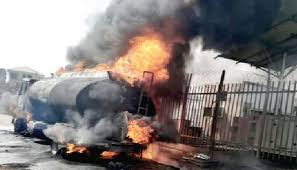Business
Six Banks Pay N155.45bn Into AMCON In Three Years
Six commercial banks have made payments totalling N155.45 billion into the sinking fund of Asset Management Corporation of Nigeria (AMCON) within three years.
Reports say that Access Bank, GTBank, United Bank for Africa (UBA), Fidelity Bank, FCMB Group and Sterling Bank made the payments between 2015 and 2017.
Data obtained from the banks’ annual reports showed that Access Bank paid the highest amount of N39.59 billion; N12.06 billion in 2015, N12.06 billion in 2016 and N15.47 billion in 2017.
It was followed by GTBank which paid N35.09 billion; N10.63 billion in 2015, N11.39 billion in 2016 and N13.07 billion in 2017, respectively.
UBA contributed N34.85 billion; N11.08 billion in 2015, N11.08 billion in 2016 and N12.69 billion in 2017.
Reports also said that Fidelity Bank paid a total of N18.60 billion, being N5.94 billion paid in 2015, N6.16 billion in 2016 and N6.50 billion in 2017.
FCMB Group accounted for N16.94 billion, N5.66 billion in 2015, N5.62 billion in 2016 and N5.66 billion in 2017, while Sterling Bank contributed N12.38 billion, N4.13 billion in 2015, N4.04 billion in 2016 and N4.21 billion in 2017.
According to reports, the Central Bank of Nigeria (CBN), on January 1, 2011, signed an agreement with banks operating in the country to establish the AMCON sinking fund.
The agreement required the CBN to contribute N50 billion and the banks an equivalent of 0.3 per cent of their total assets as at the date of their audited financial statements, annually for ten years.
However, the contribution, a non-refundable levy on all banks in Nigeria, was increased to 0.5 per cent in 2013.
The fund does not represent any ownership interest, neither does it confer any rights or obligations (save to pay the levy) on the contributor.
The money from the fund is used to purchase Federal Government securities and the returns from the investment is redistributed among the contributing banks.
The sinking fund has, however, attracted opposition from shareholders of many banks who have called on the Federal Government to scrap it to enhance shareholders return.
Specifically, National Coordinator, Progressive Shareholders Association of Nigeria, Mr Boniface Okezie, called on the Federal Government to wind down AMCON.
Okezie said that shareholders had been shortchanged by the corporation, and that the contributions to the sinking fund would have translated to huge dividend to banks’ shareholders.
He said shareholders would resort to court action if government elongated the lifespan of AMCON.
“If government dares us and elongates the lifespan of the corporation, we will go to court to challenge the decision when the time comes,” Okezie said.
Also, Publicity Secretary, Independent Shareholders Association of Nigeria, Mr Moses Igbrude, said AMCON was an emergency toxic vehicle established by the government through the CBN and stakeholders then to save the situation at hand.
Igbrude said that the government needed to evaluate the performance of AMCON to ascertain if it met the expected set goals.
He noted that the corporation’s objective was to buy banks’ toxic assets to stabilise and to avoid the collapse of the financial sector.
Head of Banking and Finance Department, Nasarawa State University Keffi, Prof. Uche Uwaleke said that all over the world, asset management companies were crisis resolution vehicles with clear mandates and a clause that defines their terminal dates.
Uwaleke called for a review of the the operations of AMCON with a view to ascertaining its continued relevance to the country’s financial system.
He urged the government to examine the extent to which the corporation had helped to curb non-performing loans in the banking sector.
However, Prof. Sheriffdeen Tella of the Department of Economics, Olabisi Onabanjo University Ago-Iwoye, Ogun is of the opinion that the problems that necessitated AMCON are yet to be fully resolved and it should be given more time to wind down.
“There is no need for the institution to wind down prematurely, else the need to resurrect it or bring up another body for the same job might be inevitable,” Tella said.
He said that the issue of unnecessary levy could be resolved by the intervention of the Chartered Institute of Bankers of Nigeria, the apex bank and AMCON.
AMCON’s Chief Executive, Mr Ahmed Kuru, said recently that with the recession, the rate at which banks’ assets were growing had reduced, affecting their contributions to the sinking fund.
Kuru said if banks’ debt to the CBN were not fully repaid before 2023 when the corporation is expected to wind down, they would continue to pay into the fund which will then be transferred to the CBN.
Business
$5bn Train 7 Project 80% Complete -NCDMB
The Board stated this in a statement released by its Corporate Communications Directorate to newsmen, recently, during the inauguration of 140 trainees for the Train 7 Project.
The trainees had undergone the Nigerian Content Human Capacity Development (NC-HCD) programme it organised in partnership with the Nigeria Liquefied Natural Gas (NLNG) Limited in Port Harcourt, the Rivers State capital.
The Tide gathered that the training programme was an intensive three-month Advanced NC-HCD Programme for the US$5 billion NLNG Train 7 Project on Bonny Island, Rivers State.
The trainees, The Tide further learnt are graduates in different academic disciplines who have completed a 12-month Basic Training Programme in diverse oil-and-gas-industry-related skill sets and are now set for an on-the-job phase which includes active hands-on participation in operational areas such as Turn Around Maintenance (TAM), Commissioning, and Desktop Programmes.
The Corporate Communications Directorate of the NCDMB told The Tide that in November 2024, a set of 331 trainees under Batch A of the NLNG T7 HCD Training Programme began capacity development in facility management, engineering, Information and Communication Technology (ICT), Health Safety and Environment (HSE), Quality Assurance and Quality Control, as well as welding and fabrication.
According to the Board, additional 77 trainees under Batch B of the same Training Programme began capacity development in data analytics and supply chain management among several other fields relevant to the operations of the oil and gas industry.
While addressing the trainees and trainers who were drawn from the Oil and Gas Trainers Association of Nigeria (OGTAN), Management Personnel of the NCDMB and NLNG, the Executive Secretary of NCDMB, Engr Felix Omatsola Ogbe, said the Advanced NC-HCD training is more than a milestone.
“The NC-HCD training programme is an expression of the collective commitment of the Board and the NLNG to nurturing world-class Nigerian professionals who will shape the future of our oil and gas industry.
“The Board has remained steadfast in its conviction that Human Capital Development is a critical investment in the sustainability and competitiveness of Nigeria’s oil and gas value chain”, the NCDMB boss said.
Business
Ageing Aviation Workforce: Minister Urges Youth Grooming For Replacement
He said the situation has resulted in widened knowledge gaps and operational challenges.
As a globally regulated sector, he said it was important that stakeholders put measures in place to attract the talents required to move the industry forward.
Keyamo, therefore, called on stakeholders in the industry to be deliberate in identifying, encouraging, nurturing and harvesting young talents to ensure a sustainable supply of manpower to the aviation sector.
Director of Public Affairs and Consumer Protection of the FAAN, Mrs Obiageli Orah, in a release made available to aviation correspondents, noted that the Minister deemed it necessary to attract the right quality of human resources required to move the sector forward.
“As a globally regulated sector, it is important that stakeholders put measures in place to continually attract the right quality and quantity of human resources required to move the industry forward.
“It is important to note that organising training programmes are avenues through which we can breed, nurture, and harvest such human resources.
“One of the critical challenges facing the industry is the ageing and retiring workforce, leading to widened knowledge gaps and operational issues.
“Training programmes, I believe, is among other things designed to make aviation appealing to the younger generation, while encouraging them to develop interest in taking up a career in the industry”, the statement stated.
Meanwhile, some aviation stakeholders have expressed concerns of countless young Nigerians who seek to make their mark in aviation, tourism, and the wider transport ecosystem but often face steep barriers to entry.
According to them, lack of access, limited mentorship, financial constraints, skill mismatches, and systemic gaps, among others, have posed some constraints to them.
Business
Ogbe Gets Appo Board Appointment
The Tide gathered that by the appointment, Ogbe becomes Nigeria’s representative on the Board of the 18-member continental body, which has its headquarters at Brazzaville, Republic of the Congo.
Ogbe was picked for this role by the Minister of State for Petroleum Resources (Oil), Senator Heineken Lokpobiri, who doubles as the Chairman of the NCDMB Governing Council.
The notice of the Executive Secretary’s appointment was conveyed in a congratulatory letter signed by the Director of Support Services, APPO, Mrs. Philomena Ikoko, on behalf of the Secretary-General of the organisation, Dr. Omar Farouk Ibrahim.
She applauded the NCDMB boss on the confidence reposed in him by the Minister, expressing her belief that he would make immense contributions to the development of the African oil and gas industry.
Mrs Ikoko stated that Ogbe was joining the Executive Board of APPO at a challenging time for the oil and gas industry, especially in Africa.
“Your appointment is a major call to duty for Nigeria and the continent. The secretariat will give you the support you will need to make a success of your assignment”, she said.
According to a statement by the Directorate of Corporate Communications and Zonal Coordination, the NCDMB played key roles in catalysing the operations of APPO and the development of local content in Africa.
The statement added that the board was providing institutional support and mentorship to several oil producing countries in their formulation of local content policies.
“The NCDMB initiated the African Local Content Roundtable (ALCR) and hosted the inaugural edition in Yenagoa, Bayelsa state, in June 2021, and the event was attended by key officials of APPO and other oil industry players.
“The idea for the Africa Energy Bank (AEB) was mooted by NCDMB’s officials at the event, as one of the strategies that would accelerate the growth of the African oil and gas industry and deepen local content.
“The Board also collaborated with APPO to host subsequent editions of the African Local Content Roundtable (ALCR), including the 2023 edition held at Abuja.
“The Africa Energy Bank, which APPO is setting up at Abuja, is aimed at pooling financial resources needed to fund big-ticket oil and gas projects across the continent, and bridge funding challenges currently impeding the development of the sector”, the NCDMB’S said.
Meanwhile, the APPO Secretary-General has said the Africa Energy Bank seeks to fund oil and gas projects across economies in Africa and help to plug critical financing gaps that exist through the continent’s over reliance on financiers from the West.
He added that each APPO member country is expected to raise $83 million with an objective of raising $5 billion capital for the establishment of the Bank.
The Tide learnt that recently Nigeria, Angola and Ghana have contributed their share capital for the African Energy Bank, which represents 44 percent of the trio’s contributions to the minimum capital that is required from oil producing countries in the continent.
It would be recalled that at the Nigerian Oil and Gas Opportunity Fair (NOGOF) held recently, the NCDMB’s Scribe confirmed that the agency was part of key institutions that pooled resources for the formation of the Africa Energy Bank.
Ogbe announced that the Bank will open for business before the end of the 2nd quarter of this year, 2025, expressing hope that it will create more funding availability for local oil and gas projects and companies.
Similarly, the Minister of State for Petroleum Resources (Oil), Senator Heineken Lokpobiri, had stated at the Offshore Technology Conference that Afrexim Bank has already raised $19billion for the take-off of the Africa Energy Bank.
According to him, $14 billion out of the funds represents the bank’s financial exposure on African oil and gas projects, with the additional $5 billion as take-off capital.
-

 Sports5 days ago
Sports5 days agoConcacaf Opposes 64-Team W’Cup Plans
-

 News5 days ago
News5 days agoNiMET Forecasts Three-Day Thunderstorms, Rain In Rivers, Edo, Others
-

 Sports5 days ago
Sports5 days agoBAL: Hoopers Coach Makes Excuses After Coming Short
-

 Sports5 days ago
Sports5 days agoGyokeres Situation, Transfer Under Cloud At Sporting
-

 City Crime5 days ago
City Crime5 days agoNEMA warns against scooping of fuel from accidented tankers
-

 Sports5 days ago
Sports5 days agoNPFL Top Scorer Bags N3.6m
-

 News5 days ago
News5 days agoJune 12: DWI Warns Nigerians Against Planned Protest By Faceless Groups
-
Sports5 days ago
Cricket: Nigeria Face Uganda Test

